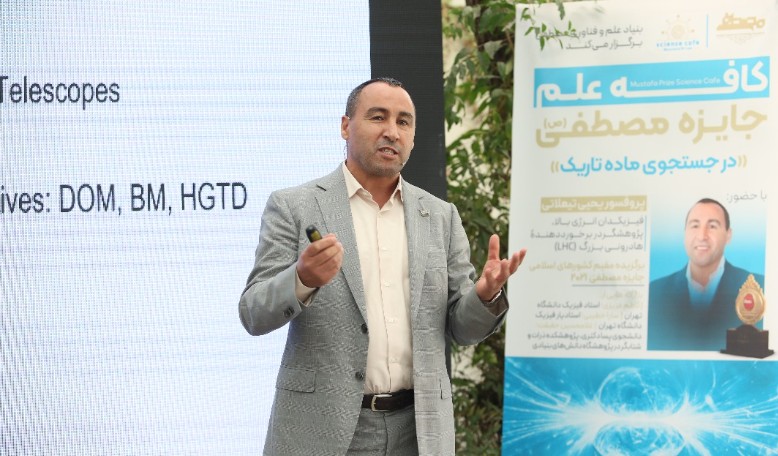‘Searching for Dark Matter’: 2021 Mustafa(Pbuh) Prize laureate attends Mustafa(Pbuh) Prize Science Café
Science Café on physics and Dark Matter was held with the presence of Yahya Tayalati, a laureate of the fourth round of Mustafa(Pbuh) Prize, on the second day of the 2021 Mustafa(Pbuh) Prize Week on October 19th.
MSTF Media reports:
Yahya Tayalati, Professor of Physics at the University Mohammed V in Rabat and the 2021 Mustafa
Prize Laureate from Islamic countries, engaged with public in a casual scientific talk regarding his research work.
The Moroccan scientist elaborated on his involvement in international collaborations such as ATLAS-LGC (CERN), and ANTARES in developing KM3NeT Telescopes.
Tayalati explained his research team’s efforts to gather 14 TeV to produce new particles by accelerating and colliding protons. He further talked about their work on Neutrinos, an enigmatic particle, and the team’s efforts to search for magnetic monopoles, and search for nuclearites, which are stable particles of strange quark matter.
Tayalati also pointed to the implication of this science in day-to-day life, such as the World Wide Web—which started with CERN (the European Organization for Nuclear Research) and Radiotherapy. He particularly referred to FLASH Radiotherapy which includes flashing cancer patients with high doses of radiation. Tayalati indicated that this type of radiotherapy is highly underexamined and underresearched among Muslim scientists.
In his talk, Tayalati also paid homage to Mohammad Abdus Salam, a Pakistani Muslim theoretical physicist and a Nobel Prize laureate, who participated in the model of elementary particles.
Tayalati humbly pointed to the fact that despite years of research and abundant technologies, “it is a shame that we understand so little from the matter surrounding us.” The scientists’ understanding of matter is 5 percent, whereas, Tayalati maintains “It is our mission to find out about the 95 percent of matter.”
He concluded: “Our main mission is the advancement of science. We don’t do politics and we do not promise anything, but we put a great deal of effort in our research.”
This event which provided an informal environment for the public’s engagement with science, hosted experts from the University of Tehran to give talks on Dark Matter.
Kazem Azizi, professor of physics at the University of Tehran, talked about the history of physics and the human beings’ early engagement with it before Galileo, Newton, and Maxwell. The latter physicists and their breakthrough theories led to what we know as modern physical science today.
According to Azizi, these physicists’ classical approach to physics up to the early 20th century lacked in answering the new rising questions, and the concept of time and space changed leading to a new era of physics. Then, there came Einstein’s relativity special and general, and later Quantum field theory changed particle physics. Detection of gravitational wave in 2015 and the first picture of the black hole in 2019 were among the latest achievements in physics.
Azizi concluded that news from CERN indicates serious signs of new physics as one of the most important goals of physics is to provide a theory of everything to explain all events in a unified way.
Sara Khatibi also from the University of Tehran, pinpointed that the standard model of particle physics, which has been the accepted theory since 1974 is not enough since this model is incapable of accounting for experimental observations, such as Baryon Asymmetry, Matter Neutrinos, and Dark Matter. Therefore, more fundamental theories are required.
Regarding Dark Matter, Khatibi observed that “gravitational effects give convincing evidence for the presence of Dark Matter in the universe. There is theoretical and experimental effort going on towards to identify Dark Matter.”
Gholam Hossein Haghighat, post-doctoral research fellow at the Institute for Research in Fundamental Sciences concluded this event with a speech regarding his research work in the School of Particles and Accelerator at the institute.

